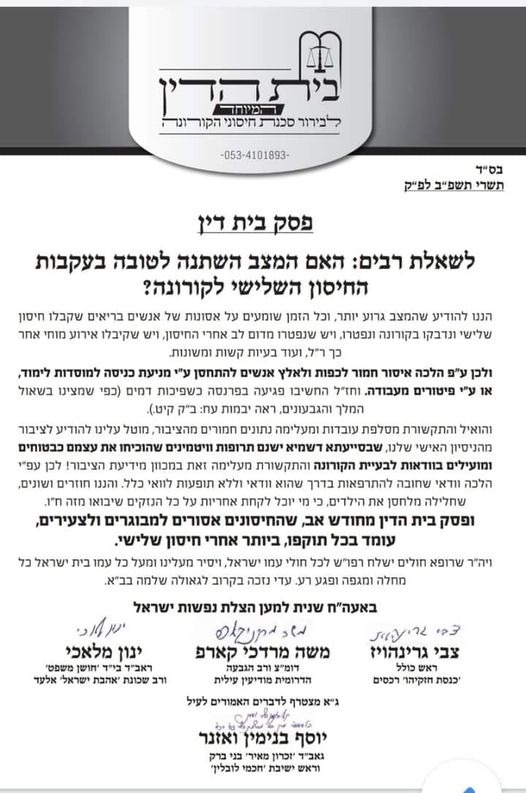The Afghan War WAS NOT a Response to 9/11
And other assorted uncomfortable truths (and weird speculations).
Find the Thierry Meyssan article here…
‘The Road Not Taken’ – What I Admire MOST About Rabbi Y.D. Grossman
In Rabbi Nachman Seltzer’s exceptional book, “Living Legend: Rabbi Grossman of Migdal Haemek” he retells many good deeds done by Rabbi Yitzchak Dovid Grossman.
But I think the greatest story of all is the invisible one, that of ongoing refraining.
I mean the story (beginning on p. 367) of Rabbi Grossman resisting seemingly unanimous calls by both the political and religious establishment’s Who’s Who to become the State of Israel’s “Chief Rabbi” — twice! — upon his father’s request \ demand.
ושים חלקנו עמהם!
If It Can’t Be Lived By EVERYONE Then It Isn’t Judaism At All!
As a continuation of our previous article…
Likutei Moharan Part II chap. 19 (עקר התכלית והשלמות הוא רק לעבד השם בתמימות גמור):
כִּי יֵשׁ מְחַקְּרִים שֶׁאוֹמְרִים, שֶׁעִקָּר הַתַּכְלִית וְהָעוֹלָם הַבָּא הוּא רַק לָדַעַת כָּל דָּבָר כְּמוֹת שֶׁהוּא, כְּגוֹן לֵידַע הַכּוֹכָב כְּמוֹ שֶׁהוּא, לֵידַע מַהוּתוֹ, וּמִפְּנֵי מָה עוֹמֵד בַּמָּקוֹם הַהוּא, כִּי יֵשׁ מַשְׂכִּיל וּמֻשְׂכָּל וְשֵׁכֶל, דְּהַיְנוּ הַכּחַ הַמַּשְׂכִּיל וְהַשֵּׂכֶל בְּעַצְמוֹ וְהַדָּבָר הַמֻּשְׂכָּל, וְזֶהוּ הַתַּכְלִית וְהָעוֹלָם הַבָּא אֶצְלָם, שֶׁיִּהְיֶה נַעֲשֶׂה אֶחָד מֵהַמַּשְׂכִּיל וְהַמֻשְׂכָּל וְהַשֵּׂכֶל…
וְתֵדַע שֶׁאֵין הַדָּבָר כְּדַעְתָּם, חַס וְשָׁלוֹם, כִּי אִם כֵּן לא יַשִּׂיגוּ הַתַּכְלִית, רַק מְתֵי מְעַט מְעַט מְאֹד, דְּהַיְנוּ הַבַּעֲלֵי שֵׂכֶל פִילוֹסוֹפִים, וּמַה יַּעֲשׂוּ קְטַנֵּי הָעֵרֶך, שֶׁאֵין לָהֶם שֵׂכֶל כָּזֶה לַחֲקר חֲקִירוֹת לָדַעַת הַמֻּשְׂכָּלוֹת, שֶׁהֵם רב וְעִקָּר הָעוֹלָם, אֵיך יַשִּׂיגוּ הֵם אֶת הַתַּכְלִית?
אֲבָל בֶּאֱמֶת עִקָּר הַשָּׂגַת הַתַּכְלִית הוּא רַק עַל יְדֵי תְּמִימוּת דַּיְקָא, דְּהַיְנוּ יִרְאַת הַשֵּׁם וּמִצְווֹת מַעֲשִׂיּוֹת בִּפְשִׁיטוּת גָּמוּר, (קהלת י”ב): “סוֹף דָּבָר הַכּל נִשְׁמָע, אֶת הָאֱלֹקִים יְרָא וְאֶת מִצְוֹתָיו שְׁמוֹר, כִּי זֶה כָּל הָאָדָם“, הַיְנוּ שֶׁשְּׁלמה הַמֶּלֶך, עָלָיו הַשָּׁלוֹם, מְלַמֵּד אוֹתָנוּ שֶׁעִקָּר הַשָּׂגַת הַתַּכְלִית, שֶׁהוּא בְּחִינַת סוֹף דָּבָר, הוּא רַק עַל יְדֵי תְּמִימוּת וּפְשִׁיטוּת, לְיִרְאָה אֶת ה’ וְלִשְׁמר מִצְווֹתָיו בִּפְשִׁיטוּת, וְזֶהוּ “סוֹף דָּבָר הַכּל נִשְׁמָע, אֶת הָאֱלֹקִים יְרָא וְאֶת מִצְוֹתָיו שְׁמוֹר”, שֶׁזֶּהוּ בְּחִינַת תְּמִימוּת וּפְשִׁיטוּת לְיִרְאָה אֶת ה’ וּלְקַיֵּם מִצְווֹתָיו בְּעֻבְדָּא וְכוּ’ בִּפְשִׁיטוּת כַּנַּ”ל, וְזֶה שֶׁסִּיֵּם: “כִּי זֶה כָּל הָאָדָם”, הַיְנוּ כִּי זֶה יָכוֹל כָּל אָדָם לְקַיֵּם וּלְהַשִּׂיג עַל יְדֵי זֶה אֶת הַתַּכְלִית, מֵאַחַר שֶׁעִקָּר הוּא “אֶת אֱלקִים יְרָא” וְכוּ’, עַל כֵּן יָכוֹל כָּל אָדָם לְהַשִּׂיג הַתַּכְלִית, כִּי זֶה כָּל אָדָם יָכוֹל לְקַיֵּם.
…
וְהַמְחַקְּרִים וְהַכּוֹפְרִים מְפָרְשִׁים כָּל הַתּוֹרָה כֻּלָּהּ עַל פִּי חָכְמוֹת וְאֶפִּיקוֹרְסוּת שֶׁלָּהֶם, שֶׁכָּל הַתּוֹרָה, וַאֲפִלּוּ מִצְווֹת מַעֲשִׂיּוֹת הַכְּתוּבִים בַּתּוֹרָה, מְפָרְשִׁים הַכּל עַל פִּי צוּרָה וָשֵׂכֶל. לָא מִבָּעֲיָא מַעֲשִׂיּוֹת הַכְּתוּבִים בַּתּוֹרָה אוֹמְרִים שֶׁהֵם מְרַמְּזִים רַק עַל הַנִּמְשָׁל וְהַצּוּרָה לְבַד, דְּהַיְנוּ שִׂכְלִיּוּת שֶׁלָּהֶם, אֶלָּא אֲפִלּוּ מִצְווֹת מַעֲשִׂיּוֹת הַמְפרָשִׁים בַּתּוֹרָה מְפָרְשִׁים הַכּל שֶׁהֵם מְרַמְּזִים רַק עַל שִׂכְלִיּוּת וְחָכְמוֹת שֶׁלָּהֶם, וְכוֹפְרִים בִּפְשׁוּטוֹ לְגַמְרֵי…
Second-Hand Story of Israeli Police Insanity
Someone told me he was witness to the following:
The Israeli State’s cops got on an intercity bus (between two Charedi cities – I believe this was on Motzei Shabbos) and demanded all passengers (Charedim, of course) wear masks, including covering the nose.
Hey, at least they didn’t take a quick picture and just hand out tickets, right?
Now, one man resisted. He began asking if today was Purim when we wear masks… But any rational person could tell at a single glance that the man was not in his right mind. Of course, no one accuses the cops of being rational, so, against the protests of the whole screaming bus, the “peace officers” just had to show the mentally ill individual “Who’s Boss”.
They tried to take him away, so he got violent and broke a copper’s nose. Then, in the most remarkable event of the evening, the constables, shockingly, let him go.
Don’t ask me. I’m just repeating the story!

